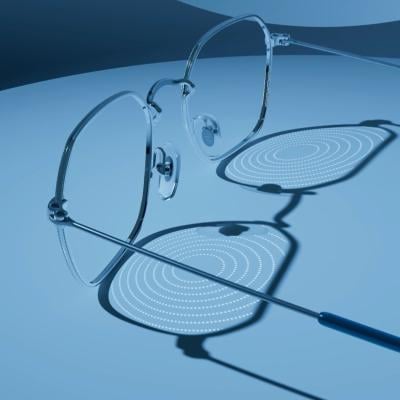The FDA has handed a groundbreaking clearance to EssilorLuxottica and its eyeglasses to help slow the progression of nearsightedness in young children—a rapidly increasing condition among U.S. adolescents and one expected to affect half the world’s population by 2050, according to EssilorLuxottica.
The international eyewear company’s Essilor Stellest lenses are designed for ages 6 to 12, including those with or without astigmatism. The glasses feature a series of concentric, raised lenslets ringed around the user’s field of view. They focus light in a way that sends a signal to the eye and puts the brake on its elongation, where the shift in the retina over time results in myopia.
According to EssilorLuxottica, clinical trials have shown that wearing Stellest for two years slowed progression by an average of 71%. The company said the prescription lenses will be made available in the U.S. in the coming weeks.

“The Essilor Stellest lens has been one of the most highly anticipated vision care products of the last decade,” EssilorLuxottica CEO Francesco Milleri and deputy CEO Paul du Saillant said in a joint statement.
“Facing a global epidemic that impacts millions of lives, we set out years ago to develop a lens that would truly answer the needs of the market, particularly the next generation. This lens technology evolves the traditional corrective lenses into a true medical treatment, and it marks the beginning of a new era for eyecare professionals in addressing myopia,” they added.
The FDA previously granted a green light to a similar technology in a disposable contact lens, with CooperVision’s MiSight in 2019. The agency said EssilorLuxottica’s de novo clearance can help fill the gap for children who cannot wear contacts, while also expanding on the age range of the MiSight’s of 8 to 12.
Meanwhile, Johnson & Johnson Vision received an agency approval in 2021 for its Acuvue Abiliti lenses, designed to be worn overnight to help address myopia by reshaping the cornea through a process known as orthokeratology.
In Europe, SightGlass Vision—a joint venture between CooperCompanies and EssilorLuxottica—received a CE mark approval in 2020 for its myopia eyeglass lenses. That company received a breakthrough designation from the FDA last year for its Diffusion Optics Technology, or DOT, which dampens the contrast around the periphery of the visual field by de-focusing and scattering light around the retina.
“As a practicing ophthalmologist, I see firsthand the lifelong impact that vision problems can have on an individual,” said Michelle Tarver, M.D., Ph.D., director of the FDA’s Center for Devices and Radiological Health.
“Today’s authorization brings to market a treatment option that may meaningfully reduce the likelihood of severe eyesight issues later in adult life, while also being easier to use and lower risk than the currently authorized devices that slow the progression of myopia in children,” Tarver said in an agency statement.
When left untreated, myopia can strengthen to the point that it may fully threaten a person’s vision, with complications such as retinal detachment, myopic maculopathy, glaucoma and cataracts later in life.